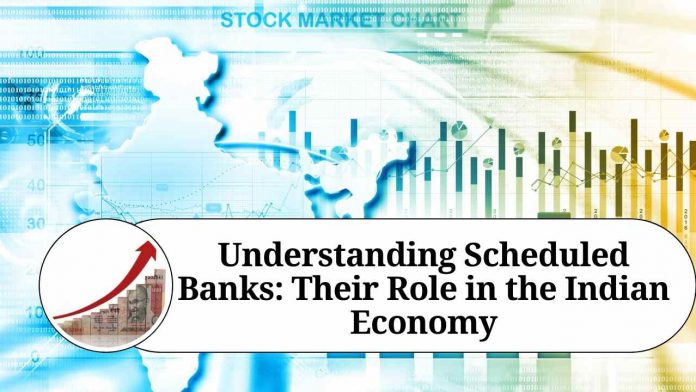INTRODUCTION
In India, scheduled banks are those banks that are included in the Second Schedule of the Reserve Bank of India Act, 1934. These banks are regulated by the Reserve Bank of India (RBI), which is the central bank of the country.
The scheduled banks in India can be classified into two categories: commercial banks and cooperative banks. Commercial banks are further categorized into public sector banks, private sector banks, and foreign banks.
Public sector banks are those banks that are owned and operated by the government. Some of the prominent public sector banks in India include State Bank of India, Punjab National Bank, Bank of Baroda, and Canara Bank.
Private sector banks are those banks that are owned and operated by private individuals or companies. Some of the prominent private sector banks in India include HDFC Bank, ICICI Bank, and Axis Bank.
Foreign banks are those banks that have their headquarters located outside India but operate in the country. Some of the prominent foreign banks in India include Citibank, Standard Chartered Bank, and HSBC Bank.
Cooperative banks are those banks that are owned and operated by cooperative societies. These banks are further classified into urban cooperative banks and rural cooperative banks.
Scheduled banks in India offer a wide range of financial services to their customers, including deposit accounts, loans, credit cards, debit cards, and internet banking. They also play a crucial role in the implementation of the monetary policy of the RBI.
The RBI regulates scheduled banks in India by setting guidelines and policies related to capital adequacy, liquidity, asset classification, and provisioning. The central bank also conducts inspections of scheduled banks to ensure that they comply with the regulatory guidelines.
The scheduled banks in India have undergone significant changes over the years. The banking sector was nationalized in 1969, and several public sector banks were established to promote financial inclusion and provide credit to priority sectors. In the 1990s, the government allowed private sector banks to enter the market, leading to increased competition and innovation in the banking sector.
The introduction of technology and digital banking has also transformed the banking sector in India. Most scheduled banks now offer internet banking, mobile banking, and digital wallets to their customers, making banking more convenient and accessible. The RBI has also launched various initiatives such as the Unified Payments Interface (UPI) and Bharat Bill Payment System (BBPS) to promote digital payments and financial inclusion.
conclusion
scheduled banks play a critical role in the Indian economy and are an important part of the financial system. They provide various financial services to customers, mobilize savings, and channelize them into productive investments. The RBI regulates scheduled banks to ensure their safety and stability and uses them as a channel to implement monetary policy. With the introduction of technology, the banking sector in India is evolving rapidly, and scheduled banks are adapting to the changing needs of customers.
Other Related Blogs: Section 144B Income Tax Act
Frequently Asked Questions (FAQs)
Q.What is a scheduled bank?
A scheduled bank is a financial institution that is licensed by the central bank or regulatory authority to accept deposits from the public and lend money to borrowers. These banks play a crucial role in the economy by providing financial services and facilitating economic growth.
Q.How are scheduled banks regulated in India?
Scheduled banks in India are regulated by the Reserve Bank of India (RBI), which is the central bank of the country. The RBI sets guidelines and policies related to capital adequacy, liquidity, asset classification, and provisioning to ensure the safety and stability of the financial system.
Q.What are the types of scheduled banks in India?
Scheduled banks in India can be classified into two categories: commercial banks and cooperative banks. Commercial banks are further categorized into public sector banks, private sector banks, and foreign banks. Cooperative banks are further classified into urban cooperative banks and rural cooperative banks.
Q.What services do scheduled banks offer?
Scheduled banks in India offer a wide range of financial services to their customers, including deposit accounts, loans, credit cards, debit cards, and internet banking. They also play a crucial role in the implementation of the monetary policy of the RBI.
Q.What is the difference between public sector banks and private sector banks?
Public sector banks are those banks that are owned and operated by the government, while private sector banks are those banks that are owned and operated by private individuals or companies. Public sector banks are generally considered to be more stable and have a wider reach, while private sector banks are known for their innovation and customer-centric approach.
Q.What is the role of scheduled banks in promoting financial inclusion?
Scheduled banks have a wide network of branches across the country and offer various financial products and services to cater to the needs of diverse customers. They play a crucial role in mobilizing savings from the public and channelizing them into productive investments, thereby contributing to the growth of the economy. They also help in promoting financial inclusion by offering banking services to underserved and marginalized communities.




















